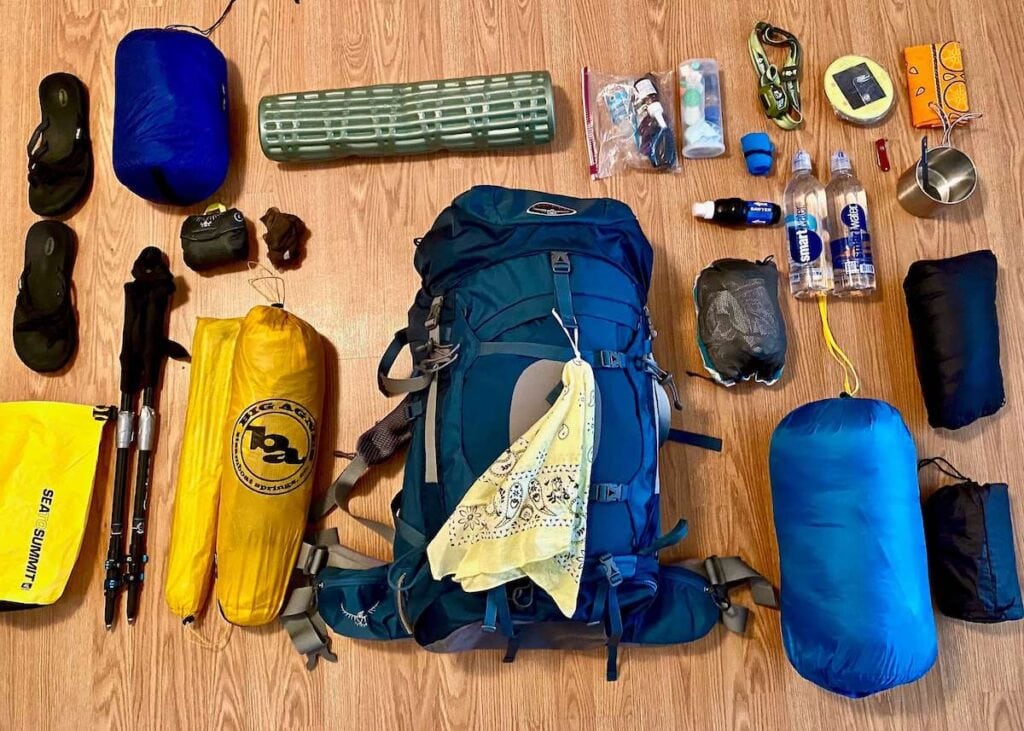Hiking Backpacks
When it comes to hiking journeys, choosing the right backpack is crucial for your comfort, safety, and overall experience. That’s why at Hiking Minds, we emphasize the importance of selecting a durable and lightweight backpack. A durable backpack ensures that it can withstand the rugged conditions of the trails, protecting your belongings from potential damage. Additionally, a lightweight backpack significantly reduces the strain on your shoulders and back, allowing you to hike longer distances without feeling weighed down. It also enables you to carry essential gear and supplies without sacrificing mobility. By prioritizing durability and lightweight design, you can focus on immersing yourself in nature and enjoying every step of your hiking adventures.

Hiking backpack choice factors
When choosing the right backpack for hiking, several factors should be taken into consideration:
-
Capacity: Consider the capacity of the backpack based on the duration of your hikes and the amount of gear you plan to carry. A day hike may require a smaller pack, while multi-day hikes may call for a larger capacity to accommodate clothing, food, and camping equipment.
-
Fit and Comfort: Opt for a backpack that fits your body well. Look for adjustable shoulder straps, a padded hip belt, and a sternum strap to distribute the weight evenly and provide stability. The backpack should feel comfortable and not cause any discomfort or strain on your back or shoulders.
-
Weight: Choose a lightweight backpack to minimize strain on your body during long hikes. Look for materials that are both durable and lightweight, such as high-quality nylon or ripstop fabrics. Keep in mind that lighter weight often comes at a higher cost, so find the right balance between weight and durability.
-
Organization and Accessibility: Consider the backpack’s organization features, such as multiple compartments, pockets, and attachment points for easy access to essentials like water bottles, snacks, and navigation tools. Look for external pockets or compression straps for quick access to frequently used items.
-
Durability and Weather Resistance: A hiking backpack should be able to withstand rough conditions and protect your gear from the elements. Look for backpacks made from durable materials with reinforced stitching and a water-resistant or waterproof coating to keep your belongings safe and dry during unexpected rain or wet conditions.
By considering these factors, you can select a backpack that suits your hiking needs, ensuring a comfortable and enjoyable outdoor experience.

Top 5 hiking backpacks
While preferences may vary based on individual needs and preferences, here are five highly regarded backpacks for hiking and mountain adventures:
-
Osprey Atmos AG 65: This backpack offers a spacious capacity of 65 liters and features Osprey’s Anti-Gravity suspension system for exceptional comfort and weight distribution. It includes numerous pockets for organization, a removable top lid that converts into a daypack, and excellent durability for rugged terrain.
-
Deuter Aircontact Lite 60+10: Known for its excellent ventilation system, this backpack provides a comfortable fit for extended hikes. With a capacity of 60+10 liters, it offers ample storage, an adjustable back length, and a durable construction suitable for alpine environments.
-
Gregory Baltoro 65: Designed with comfort and load-carrying capability in mind, the Gregory Baltoro 65 is ideal for multi-day hikes and mountainous terrain. It features a well-padded suspension system, a spacious main compartment, and various organizational pockets, along with a removable daypack.
-
Arc’teryx Bora AR 63: This premium backpack is known for its innovative design and exceptional performance. The Bora AR 63 offers a comfortable and customizable fit, a separate sleeping bag compartment, durable construction with waterproof materials, and a top lid that converts into a sling pack.
-
REI Co-op Flash 55: For those seeking a lightweight and affordable option, the REI Co-op Flash 55 is a popular choice. It provides a capacity of 55 liters, adjustable suspension, multiple access points, and a removable top lid for versatility. The backpack is designed to be lightweight without compromising on durability.
Backpacks FAQs
Q: Is wearing a backpack bad for your back?
A: Wearing a backpack for an extended period can potentially lead to discomfort and strain on your back if not properly fitted or overloaded. However, with the right fit and weight distribution, wearing a backpack for a reasonable duration should not cause significant harm to your back. To minimize potential negative effects, ensure the backpack is adjusted properly to your body, distribute weight evenly, pack light, take regular breaks to rest your back, and consider strengthening your core and back muscles to provide better support. If you experience prolonged pain or discomfort, it’s important to listen to your body and adjust or remove the backpack, and consult with a healthcare professional if you have pre-existing back conditions or concerns.
Q: Is 40 too old for backpacking?
A: Absolutely not! Age should never be a barrier to pursuing activities like backpacking. Many individuals in their 40s and beyond continue to enjoy backpacking and find it to be a fulfilling and adventurous experience. It’s important to consider your fitness level, overall health, and any pre-existing conditions, but as long as you are in good health and physically capable, backpacking can be a wonderful way to explore nature, challenge yourself, and enjoy the outdoors. It’s always a good idea to consult with a healthcare professional before engaging in any physically demanding activities, but age alone should not discourage you from embracing the joys of backpacking.
Trails
Nature
Forest
Mountain
Coastal
Urban
''The journey of a thousand miles begins with a single step.''

